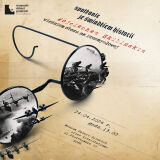back...A meeting with Wojciech Skibiński

“It has been 79 years since the end of the Second World War. There are only a few surviving witnesses of those events who can tell the youngest generation about their family history set in the dramatic realities of the German occupation of Polish lands,” said Dr Ireneusz Piotr Maj, director of the Museum of Polish Children – Victims of Totalitarianism, in connection with a meeting of Łódź youth with Wojciech Skibiński, a former prisoner of the camp on Przemysłowa Street.
On 24 April 2024, the Museum of Polish Children – Victims of Totalitarianism at ul. Piotrkowska 90 hosted Wojciech Skibiński, a doctor from Puszczykowo, who as a boy of less than three years, together with his older siblings, was sent to the German concentration camp for Polish children at Przemysłowa Street in Łódź.
“Wiesława, Jerzy and Wojciech Skibiński (born 1933, 1935 and 1940) - siblings from an intelligentsia family from Mosina, children of Czesław and Teresa, née Namysłowska. The family punished by the Germans for collaborating with the anti-Hitler underground, being part of the ‘Mosina Affair' (...). All three of them were sent to the Lodz camp on 14 September 1943, together with a large group of children from Mosina (...). Wojciech was only two years and five months old at the time of his arrest, so he was kept in a separate building for the youngest children, who were looked after by older siblings and designated female prisoners. Both the brothers were sent by the Germans to the camp in Potulice in July 1944, where they saw its end in January 1945,” as can be read in the Museum's publication entitled “We were taught to cry without tears”.
The meeting was attended by young people from schools in Lodz, who came in large numbers and listened with interest to the story of the tragic fate of the small prisoners of the camp at Przemysłowa Street. This was followed by a discussion in which the youth took an active part.
We would like to thank Mr Wojciech Skibiński for his time and all the participants of the meeting for their attendance and interest in the fate of Polish children during the Second World War.









